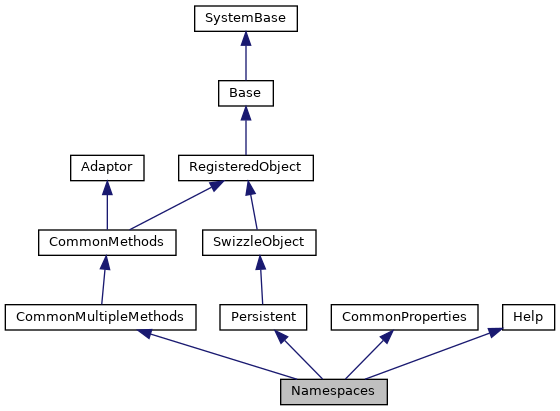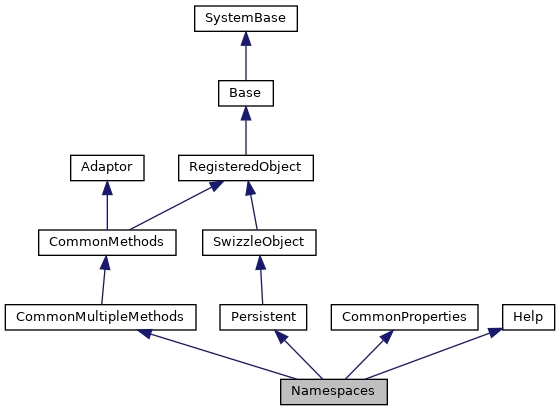This class allows you to modify and view the [Namespaces] section of the CPF file through programatic APIs. More...


Public Attributes | |
| Globals | |
| Default database for globals. More... | |
| Interop | |
| Enable interoperability. More... | |
| Routines | |
| Default database for routines. More... | |
| TempGlobals | |
| Default database for temporary globals. More... | |
 Public Attributes inherited from CommonProperties Public Attributes inherited from CommonProperties | |
| CPFFile | |
| CPF file which the object maps to. More... | |
| Comments | |
| Embedded comments in the CPF file. More... | |
| Flags | |
| Flags governing how the object is processed when Save() is called. More... | |
| Name | |
| Name of the object instance. More... | |
Static Public Attributes | |
| CAPITALNAME = None | |
| Namespace name is always capitalized. More... | |
 Static Public Attributes inherited from CommonMultipleMethods Static Public Attributes inherited from CommonMultipleMethods | |
| CAPITALNAME = None | |
| Determines if the Name specified in the index should be capitalized. More... | |
| SECTIONTYPE = None | |
| This parameter governs how the class creates audit records. More... | |
 Static Public Attributes inherited from CommonProperties Static Public Attributes inherited from CommonProperties | |
| DOMAIN = None | |
| This class contains properties which are included by classes which manipulate sections in the CPF file. More... | |
This class allows you to modify and view the [Namespaces] section of the CPF file through programatic APIs.
While properties are usually modified through the System Management portal, there may be some occasion where modifying them through the API's is best for your system. In all the Config methods, if you do not specify the CPFFile parameter, the currently active CPF file is used. If you wish to modify a CPF file which is not the currently active one, then specify the CPFFile you wish to modify in the method call.
The Flags parameter does not normally need to be specified; the defaults are usually sufficient for most cases.
You can use either the provided API's (Create/Get/Modify/Delete) to modify the properties by passing in the correct parameters, or use Object syntax to open and directly manipulate the config objects (Open() and Exists()). Most objects created here need only to specify the Name of the object, and 1 or 2 properties since the the defaults are what are commonly used for most cases.
EXAMPLE:
; Use class methods to create an instance
SYS>s Name="ABC"
SYS>s Properties("Globals")="USER"
SYS>s Status=##Class(Config.Namespaces).Create(Name,.Properties)
SYS>i 'Status w !,"Error="_$SYSTEM.Status.GetErrorText(Status)
; Use class methods to modify properties
SYS>s Status=##Class(Config.Namespaces).Get(Name,.Properties)
SYS>i 'Status w !,"Error="_$SYSTEM.Status.GetErrorText(Status)
SYS>zw Properties
Properties("Globals")="USER"
Properties("Library")="IRISLIB"
Properties("Routines")="USER"
Properties("SysGlobals")="IRISSYS"
Properties("SysRoutines")="IRISSYS"
Properties("TempGlobals")="IRISTEMP"
SYS>s Properties("Globals")="SAMPLES"
SYS>s Status=##Class(Config.Namespaces).Modify(Name,.Properties)
SYS>i 'Status w !,"Error="_$SYSTEM.Status.GetErrorText(Status)
; Now use Objects to modify properties
SYS>s Obj=##Class(Config.Namespaces).Open(Name)
; We could have used i ##Class(Config.Namespaces).Exists(Name,.Obj) instead of Open()
SYS>w Obj.Globals
SAMPLES
SYS>s Obj.Routines="USER"
SYS>s Status=Obj.Save()
SYS>i 'Status w !,"Error="_$SYSTEM.Status.GetErrorText(Status)
; Now delete the object we just created
SYS>s Status=##Class(Config.Namespaces).Delete(Name)
SYS>i 'Status w !,"Error="_$SYSTEM.Status.GetErrorText(Status)
|
static |
Namespace name is always capitalized.
| Globals |
Default database for globals.
| Interop |
Enable interoperability.
| Routines |
Default database for routines.
| TempGlobals |
Default database for temporary globals.